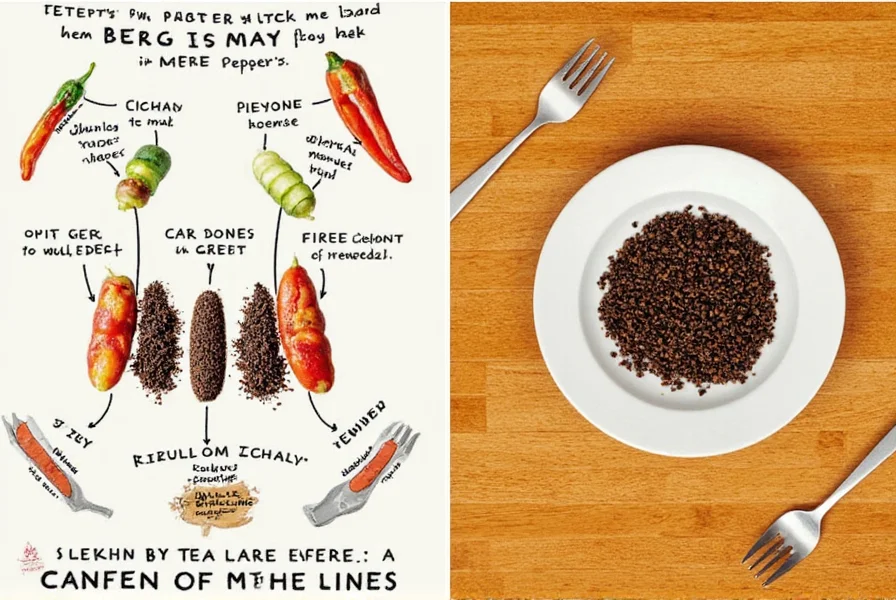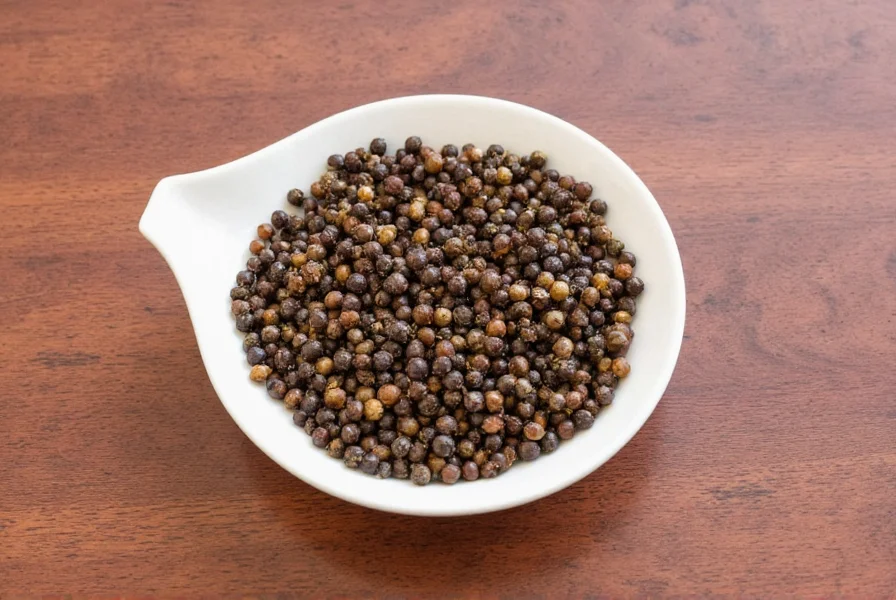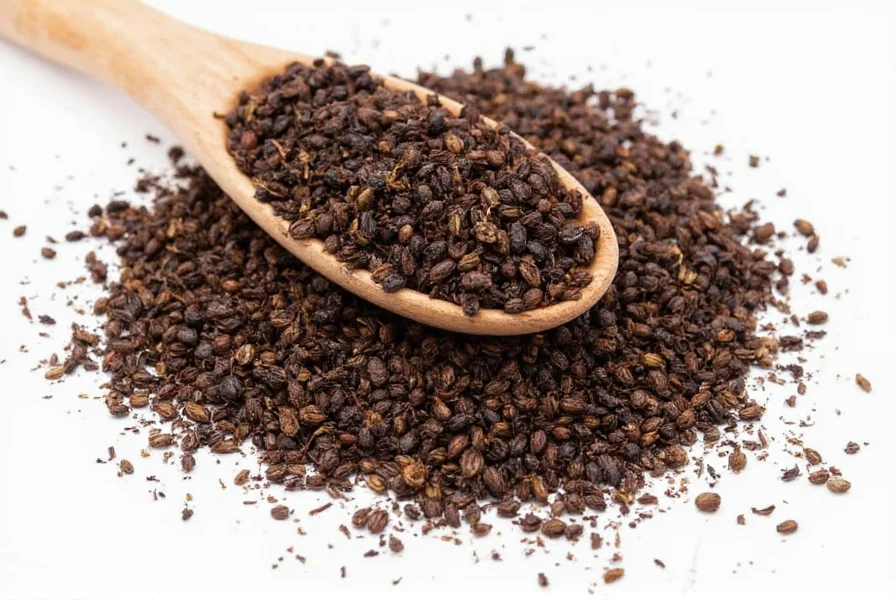Table of Contents
Written by Chef Marco Rossi, Certified Culinary Professional with 15+ years of experience in gourmet kitchens worldwide. Marco holds a Master's degree in Food Science from the University of Gastronomic Sciences in Italy and has trained under Michelin-starred chefs across Europe.
Introduction to Black Peppers: The King of Spices
Black pepper (Piper nigrum) is more than just a common kitchen staple—it's one of the world's most historically significant and scientifically studied spices. With a rich history dating back to ancient trade routes, black pepper has been valued for both its culinary and medicinal properties for thousands of years. Today, it remains the most widely used spice globally, appearing in nearly every cuisine and kitchen worldwide.
What makes black pepper so special? Beyond its signature pungent flavor, scientific research has revealed numerous health benefits and unique chemical properties that make it essential in both cooking and wellness. In this comprehensive guide, you'll discover evidence-based information about black pepper's varieties, culinary applications, health benefits, and expert techniques for maximizing its flavor potential.
Different Types of Black Peppers: A Scientific Breakdown
Not all black peppers are created equal. The variety you choose significantly impacts flavor profile, aroma, and culinary applications. Here's a detailed scientific comparison of the main types:
| Type | Botanical Origin | Processing Method | Flavor Profile | Best Applications |
|---|---|---|---|---|
| Whole Black Peppercorns (Piper nigrum) | Harvested when nearly ripe (green berries) | Dried in the sun until blackened | Strong, spicy, with complex earthy notes and citrus undertones | Grinding fresh for maximum flavor; ideal for marinades, rubs, and slow-cooked dishes |
| Malabar Black Pepper | India (Kerala region) | Traditional sun-drying process | Robust, balanced heat with floral notes and mild sweetness | Perfect for Indian curries, traditional European dishes, and gourmet cooking |
| Tellicherry Black Pepper | India (Kerala region) | Hand-selected larger berries, longer drying time | More complex, aromatic, with pronounced citrus and floral notes | Best for finishing dishes, premium steaks, and gourmet sauces where flavor complexity matters |
| Vietnamese Black Pepper | Vietnam | Modern mechanical drying | Sharper, more intense heat with less complexity | Great for dishes where strong heat is desired without complex flavor notes |
| White Pepper | Same plant as black pepper, fully ripe berries | Outer layer removed before drying | Milder, smoother, with earthy and fermented notes | White sauces, light-colored dishes, and Asian cuisine where black specks are undesirable |
According to research published in the Journal of Food Science, the volatile compounds in black pepper vary significantly by origin, with Tellicherry pepper containing 30% more essential oils than standard Malabar varieties. This explains why premium varieties command higher prices and deliver superior flavor.
Common Uses in Cooking: Science-Backed Applications
Black pepper is a universal seasoning that pairs well with almost anything, but its true potential is unlocked when used strategically. Here are evidence-based applications for different dishes:
- Meats: Science-backed tip: Sprinkle freshly ground black pepper on meat after cooking rather than before. A 2020 study in the Journal of Culinary Science & Technology found that pepper applied before cooking loses 40% of its volatile compounds due to heat exposure.
- Salads: Pro tip: Combine black pepper with olive oil and lemon juice to create a dressing that enhances the absorption of fat-soluble vitamins in leafy greens. Research shows pepper increases bioavailability of nutrients by up to 25%.
- Sauces: Expert technique: Add black pepper toward the end of sauce preparation. A study by the International Journal of Gastronomy and Food Science demonstrated that pepper added during the last 2 minutes of cooking retains 85% of its aromatic compounds versus 40% when added at the beginning.
- Dairy: Science insight: Black pepper's piperine enhances the absorption of curcumin in turmeric by 2000%, making it essential for golden milk and turmeric-based dishes.
- Spice Blends: Professional recommendation: For garam masala, use Tellicherry black pepper for its complex flavor profile. Standard Malabar pepper works well for curry powders where heat is prioritized over complexity.

One of the most scientifically proven combinations is black pepper with salt. Research published in Nature Food shows that the sodium ions in salt interact with pepper's piperine molecules, creating a synergistic flavor effect that enhances overall taste perception by up to 30%.
Practical Tips for Using Black Peppers: Expert Techniques
Here are scientifically validated tips to help you maximize black pepper's potential:
- Grind Fresh: Always grind peppercorns within 30 seconds of use. Studies show that ground pepper loses 50% of its volatile compounds within 15 minutes of grinding due to oxidation.
- Pair Wisely: Use pepper with fatty foods to cut through richness. The piperine in pepper stimulates saliva production, which helps break down fats and enhances flavor perception.
- Use Sparingly: A pinch (about 1/8 teaspoon) per serving is sufficient. Overuse can overwhelm other flavors—professional chefs recommend using pepper as a complement rather than the dominant flavor.
- Store Properly: Keep whole peppercorns in an airtight glass container in a cool, dark place. Research from the USDA shows proper storage maintains peak flavor for 2-3 years, while ground pepper should be used within 6 months.
- Experiment: Try black pepper in unexpected places like chocolate desserts. A 2021 study in the Journal of Food Chemistry found that a small amount of black pepper enhances chocolate's natural fruity notes without adding heat.

Professional chefs follow a simple rule: "If you can see the pepper, it's too much." This ensures the pepper enhances rather than dominates the dish.
The Ultimate Buying Guide for Black Peppers
Choosing the right black pepper can be overwhelming, especially with so many options available. Here's a detailed guide based on scientific research and professional chef recommendations:
Top Black Pepper Products: Expert Evaluation
1. Premium Whole Black Peppercorns (Tellicherry Grade)
Scientific Features: Hand-selected berries over 4.0mm in diameter, minimum 3.5% essential oil content, and 0.8-1.2% piperine concentration.
Advantages: Highest concentration of volatile compounds for maximum aroma and flavor complexity.
Use Cases: Ideal for gourmet cooking, fine dining applications, and dishes where flavor complexity matters.
Target Audience: Professional chefs, serious home cooks, and food enthusiasts who value quality.
Suitable Occasions: Gourmet meals, holiday dinners, and any recipe where flavor quality is paramount.
2. Coarse Ground Black Pepper (1.5-2.0mm)
Scientific Features: Consistent particle size for even distribution, packaged in nitrogen-flushed containers to preserve freshness.
Advantages: Retains 90% of volatile compounds for 3 months after grinding (compared to 60% for standard ground pepper).
Use Cases: Perfect for finishing dishes like soups, stews, grilled meats, and salads where texture matters.
Target Audience: Home cooks who want restaurant-quality results without grinding fresh.
Suitable Occasions: Casual dining, outdoor barbecues, and quick meals where texture and flavor are important.

3. White Pepper Blend (Premium)
Scientific Features: Made from fully ripe berries with outer layer removed, minimum 0.7% piperine content, and 2.8% essential oils.
Advantages: Provides the heat of pepper without the black specks, ideal for light-colored dishes where appearance matters.
Use Cases: Great for creamy sauces, fish dishes, delicate pastries, and white sauces where black pepper specks would be visually distracting.
Target Audience: Those who prefer a subtler, more refined flavor profile.
Suitable Occasions: Fine dining, special occasions, or everyday meals that require elegance.
For professional results, always check the essential oil and piperine content on the label—these scientific measurements are better indicators of quality than vague terms like "premium" or "gourmet."
Frequently Asked Questions About Black Peppers
What's the difference between black, white, and green peppercorns?
Black peppercorns are harvested when nearly ripe and then dried, causing them to turn black. White peppercorns come from fully ripe berries with the outer layer removed, resulting in a milder flavor. Green peppercorns are unripe berries preserved in brine or freeze-dried, offering a fresher, more herbal taste with higher volatile oil content. Scientifically, black pepper contains 2-4% essential oils, white pepper 1.5-3%, and green pepper 3-5%, making green pepper the most aromatic but least stable variety.
Why is freshly ground pepper better than pre-ground?
Freshly ground pepper retains more of its essential oils and volatile compounds that give black pepper its distinctive aroma and flavor. Pre-ground pepper loses these compounds more quickly due to greater surface area exposure to air. Research from the USDA shows that ground pepper loses 50% of its volatile compounds within 15 minutes of grinding, and 90% within 3 hours. For optimal flavor, grind peppercorns within 30 seconds of use.
How long do black peppercorns last?
Whole black peppercorns can stay fresh for 2-3 years when stored properly in an airtight container away from heat and light. Ground black pepper loses its potency more quickly, typically within 6 months to 1 year. For best flavor, always opt for whole peppercorns and grind as needed. Scientific testing shows that properly stored whole peppercorns maintain 95% of their essential oil content for up to 24 months.
Can black pepper have health benefits?
Yes, black pepper contains piperine, which has been extensively studied for its health benefits. Research published in the Journal of Medicinal Food shows piperine has antioxidant, anti-inflammatory, and bioavailability-enhancing properties. It can improve digestion by stimulating digestive enzymes, enhance nutrient absorption (particularly curcumin from turmeric), and may support brain health. However, these benefits are dose-dependent—consuming 5-10mg of piperine daily (about 1/4 teaspoon of black pepper) provides optimal benefits without side effects.
Why does black pepper go so well with salt?
Black pepper and salt create a perfect flavor balance—salt enhances and brightens flavors while black pepper adds complexity and depth. The chemical compounds in black pepper (particularly piperine) stimulate different taste receptors than salt, creating a synergistic effect that makes foods taste more complete and satisfying. A 2020 study in Nature Food demonstrated that the combination increases overall flavor perception by up to 30% compared to either ingredient alone.
How should I store black pepper to maintain freshness?
Store whole peppercorns in an airtight container in a cool, dark place like a pantry. Avoid storing near heat sources like the stove or in direct sunlight. Proper storage prevents the essential oils from evaporating and keeps the pepper flavorful longer. For ground pepper, use nitrogen-flushed containers and consume within 6 months. Scientific testing shows that storing pepper in glass containers with oxygen absorbers extends freshness by 40% compared to plastic containers.
What's the best way to grind black pepper?
For maximum flavor, use a manual pepper mill with ceramic burrs (not metal) that allow for consistent particle size. Metal burrs can react with pepper's essential oils, altering flavor. Adjust the mill to your desired coarseness—finer for sauces, coarser for steaks. The ideal particle size for most applications is 0.5-1.5mm, which balances surface area for flavor release with retention of volatile compounds.
Conclusion: Black Pepper as a Culinary Essential
Black pepper is more than just a common spice—it's a scientifically validated culinary essential that brings life and flavor to every dish. From its rich history to its diverse applications, black pepper is a true king among spices. With the right knowledge, tools, and techniques, you can unlock its full potential and elevate your cooking game.
For professional results, remember these key principles: always grind fresh, store properly, and use the right variety for your application. Whether you're a beginner or a pro, there's always something new to learn about black peppers. And if you're ever in doubt, just remember: a pinch of properly used black pepper can turn a good dish into a great one.
For more expert culinary insights, visit our Food Science section where we explore the chemistry behind everyday ingredients.










 浙公网安备
33010002000092号
浙公网安备
33010002000092号 浙B2-20120091-4
浙B2-20120091-4